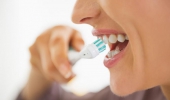Words: Lisa Heald
A controversial announcement by the Tooth Fairy today has revealed shares in pearly whites are at an all time low. Sadly, the greatest disease among children under the age of five is tooth decay, and, say Intercare Dental, if good oral hygiene isn't practiced from a young age, there will be little to no interest from Fairyville as to what's hidden under your child's pillow.
September is National Oral Health Month and, in an effort to raise awareness over tooth decay (also called dental caries), Intercare Dental has bitten down hard on the rollout of a dental campaign to not only get parents excited about establishing good brushing habits in their children, but kids too.
"Some parents believe it's not important to look after baby teeth as they will eventually fall out but oral hygiene is imperative from the moment the first tooth makes its rewarding debut," says Professor Johan Hartshorne, Dental Surgeon at IntercareTyger Valley Dental Centre of Excellence. "Tooth decay can cause pain, infection and even affect your child’s growth. Severe decay - even in baby teeth - can have serious consequences for your child’s speech and jaw development. The longer tooth decay is left untreated, the more your child will experience pain and discomfort, a higher risk of new decay in other baby and adult teeth, more complicated and expensive treatment, anxiety when he or she does visit a dentist (because he or she might start to associate dentists with pain) and loss of time at school."
Johan explains oral hygiene is the practice of keeping the mouth and teeth clean to prevent dental problems, most commonly dental cavities, gingivitis and bad breath. Your child's mouth can be kept clean and healthy by brushing and flossing twice a day and by seeing a dentist every six months.
"Your baby's gums are the 'lifeline' for their teeth so gum health is just as important as caring for the actual tooth itself," says professor Hartshorne. "Begin cleaning your baby’s mouth during the first few days after birth by wiping the gums with a clean, moist gauze pad or washcloth. As soon as teeth appear, decay can occur. A baby’s front four teeth usually push through the gums at about six months of age, although some children don’t have their first tooth until 12 or 14 months. For children younger than three years, caregivers should begin brushing children’s teeth as soon as they begin to come into the mouth by using fluoride toothpaste in an amount no more than the size of a grain of rice. For children three to six years of age, use a pea-sized amount of fluoride toothpaste. Brush teeth thoroughly twice per day (morning and night). When your child has two teeth that touch, you should begin flossing their teeth daily. Supervise children’s brushing and remind them not to swallow the toothpaste."
Kids are naturally against regular 'mouth inspections', especially little ones, so early tooth decay and developmental problems can be pretty hard to spot. "That's where a dentist is needed," says Hartshorne. "We recommend children have their first dentist visit before their first birthday as taking your child to the dentist at a young age is the best way to prevent tooth decay, and can also help parents learn how to clean their child's teeth. Many first visits are nothing more than informal 'introductory icebreakers' to acquaint your child with the dentist and the practice, and will generally only be between 15 and 30 minutes long."
Parents across South Africa trust Intercare Dental centres to take care of the health of their children's teeth. Intercare Dental centres feature fully fledged dental departments staffed by experienced dentists and oral hygienists qualified to provide a full range of dental services ranging from routine dental care to specialised dental services and oral hygiene. Most of their dental departments offer general dental services, oral hygiene, teeth whitening, porcelain crowns, veneers and inlays, implants, full dental rehabilitations, periodontal screening and treatment and treatment of occlusal disease (a number of pathological conditions associated with the bite, jaw muscles and the temporo-mandibular joint).











